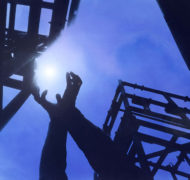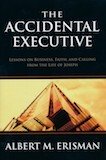Let Freedom Ring
Blog / Produced by The High Calling
Today is the Fourth of July, and I'm remembering a moment two years ago when I stood outside a prison door, realizing how freedom can catch hold of people in rancorous places. But I had to get up close before that realization hit home.
I shield a hand over my eyes, to see the sun glinting off the metal mesh of the state prison's razor wire, coiling over on itself.
I imagine the people on the other side, with long rap sheets and trails of horror. If I think long enough about people that way—about what they’ve done wrong—my imagination uses broad strokes to paint folks into small corners. And pretty soon, caricatures end up with clenched jaws, blood-shot eyes, and arms crossed over burly chests. And I want to turn around and go home.
But I open the door anyway, drawn in by a quiet nudging in the soul, and perhaps by my own curiosity of who stood on the other side.
My husband is part of a Christian ministry group that hosts retreats inside the prison two times a year, and he had invited me to join him behind the razor wire. Guests could spend Sunday afternoon with the prisoners, dining, praying and communing.
At the front security gate, we show our IDs, turn pockets inside out, then walk through a heavy door that buzzes its welcome. The door clanks behind me, then seals us as captives, with a noisy thud.
This is what they call the “inside.” Drab concrete walls. Long hallways. Rooms full of drug dealers, arsonists, abusers and robbers. And one of them comes straight at me, with an open hand.
“Hi. I’m James.” He has a scruffy beard, a scar on his cheek. He smiles. I stare, and he keeps holding out that hand. I take it. We shake. His hand is soft.
He pulls out a chair for me, then tells me the story of the bad deed—drug dealing—that brought him to this place. He shows me a photograph hidden between pages in his Bible. I lean in close to look, straight into the bright eyes of a little girl, his girl, wearing a sundress.
I hear the ache in his voice, etched with regret as he taps a finger on that single, worn photograph. He didn't get to be there for her birth.
“I know I done wrong,” he says, and shakes his head.
We eat dinner next to one another, laughing like old friends meeting at Panera, but we're not sitting at bistro tables eating paninis. We lift sporks to our mouths on the back-side of coiled razor wire.
Soon, the pastor calls all 100 of us to the other side of the gym. One of the prisoners—a bald tenor with a round belly—stands to sing opera. People used to pay to hear him sing, and now a prison gym echoes with his silky vibrato:
Roll Jordan, roll
Roll Jordan, roll
I wanna go to heav’n when I die
To hear ol’ Jordan roll
I can feel my eyes filling, standing beside James, standing in a room filled with thieves and “thugs.”
The song ends, and we bow our heads in prayer. I whisper words on the inside: “I know I done wrong.”
Then we file forward, in one steady march, toward a singular cup, held out for us all.
One after another, hungry beggars needing forgiveness dip wafers into one common cup. I know it to be true, right in this moment, when I inch forward: The ground is level at the foot of the cross.
Maybe you could say we’re all criminals—that more than one thief cried out to Jesus that day on Calvary. I do know that Christ whispered forgiveness over the whole sorry lot of us.
Tears fall steadily down my cheeks, while I shuffle forward, finding myself at the front of a long line of sinners. I take a thin, dry wafer from a pastor. Beside the pastor, a prisoner holds out the cup for me: “The blood of Christ, shed for you.”
I dip the wafer in and lift forgiveness to my lips. And right then, I taste and see, and I hear it loud, the way that freedom still rings down through the ages.
Post by Jennifer Dukes Lee.






